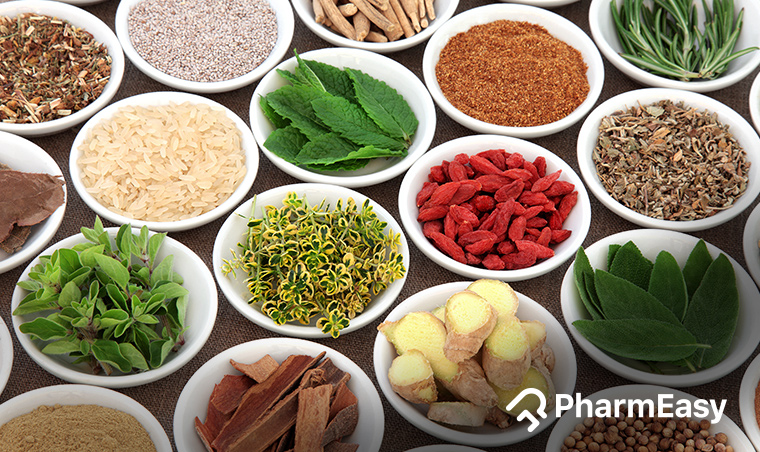Ashwagandharishta: Uses, Benefits, Side Effects & More!
By Dr Anuja Bodhare +2 more

Get,

to manage your symptom
Get your,


4 Cr+ families
benefitted

OTP sent to 9988776655



You’ve successfully subscribed to receive
doctor-approved tips on
Whatsapp

Get ready to feel your best.

Hi There,
Download the PharmEasy App now!!


Register to Avail the Offer
Send OTPBy continuing, you agree with our Privacy Policy and Terms and Conditions

Hi There,
Sign up on PharmEasy now!!
Trusted by 4 crore+ families

OTP sent to 9988776655



You have unlocked 25% off on medicines




Code: NU25
By Dr Anuja Bodhare +2 more
Table of Contents
Ashwagandharishta is an Ayurvedic polyherbal preparation known for its varied therapeutic uses. Ashwagandharishta is widely used in the branch of Rasayana, which lengthens lifespan and rejuvenates the body. The name Ashwagandharishta comes from its chief ingredient Ashwagandha, a herb. 1
The list of ingredients of Ashwagandharishta are:

Did you know?
Ashwagandharishta is a well-known Ayurvedic remedy with immense therapeutic uses. The roots of Ashwagandha are used as an adaptogen in both Ayurveda and Unani medicine.2 Some of the key medicinal qualities of Ashwagandharishta are:
Did you know that the fermentation process known as “Asava-Arishta” is used to make Ashwagandharishta. In this method, the herbs are soaked in water or a decoction with honey or jaggery, and then they are fermented for a predetermined amount of time. The medicinal qualities of the herbs are enhanced by this fermentation.
Dr. Siddharth Gupta, B.A.M.S, M.D (Ayu)
Also Read: Gokshura – Uses, Benefits, Side Effects & Precautions
Also Read: Lavender – Uses, Benefits & Side Effects
Ashwagandharishta is an ayurvedic tonic that is prescribed by the physician to be taken as directed.10
Your Ayurvedic physician will prescribe you the form and dosage as per your health condition.
According to Ayurveda, Ashwagandharishta might help in reducing stress and anxiety by balancing the Vata and Pitta doshas. The Vata and Pitta are said to be involved in maintaining the energy flow and various bodily functions. Additionally, Ashwagandha, one of the major ingredients of Ashwagandharishta is said to have adaptogenic properties that can help in reducing stress and anxiety.
Dr. Rajeev Singh, BAMS
The most common side effects of Ashwagandha, which is the chief ingredient of Ashwagandharishta are:
Ashwagandharishta might help in increasing sperm count. According to a small-scale study, root extracts of ashwagandha, which is the main ingredient of Ashwagandharishta powder are believed to have spermatogenic activities which can stimulate sperm count.
Dr. Smita Barode, B.A.M.S, M.S.
Also Read: Triphala – Uses, Benefits & Side Effects
Ashwagandha, which is one of the significant ingredients of Ashwagandharishta, must be used with caution in certain health conditions like
Also Read: Nirgundi – Uses, Benefits & Precautions
Yes, Ashwagandharishta is beneficial in reducing the symptoms of osteoarthritis. Osteoarthritis is a progressive degenerative disease of the joint cartilage. A significant cause of the disorder is the activity of the collagenase enzyme that degenerates the collagen of the joints. Ashwagandharishta can inhibit collagenase activity and help to soothe the symptoms of osteoarthritis.5
Yes, Ashwagandharishta has proven antibacterial properties against various common human pathogens. It can act as an antibiotic against Staphylococcus aureus, Bacillus subtilis, Salmonella typhi, Escherichia coli, and Pseudomonas aeruginosa, which are the most common human pathogens.6
Please follow the directions of your Ayurvedic physician on the dosage and directions.
The anti-stress and anxiety-preventing effects of the roots of Ashwagandha, the chief ingredient of Ashwagandharishta, are very helpful in providing mental peace. Ashwagandharishta can help overweight and obese patients control their eating behaviour and improve mental well-being. These therapeutical qualities of Ashwagandharishta may be beneficial in weight loss.2
Please do not drive if you feel sleepy after taking the medication. One of the side effects of Ashwagandharishta is drowsiness and dizziness.13 Hence, please consult your doctor for specific directions.
The use of Ashwagandha is not recommended in pregnant women.13 Please consult your physician for further recommendations.
Also Read: Shallaki – Uses, Benefits & Precautions
1. Salve J, Pate S, Debnath K, Langade D. Adaptogenic and Anxiolytic Effects of Ashwagandha Root Extract in Healthy Adults: A Double-blind, Randomized, Placebo-controlled Clinical Study. Cureus [Internet]. 2019 Dec 26 [cited 2022 Feb 28];11(12). Available from: https://www.ncbi.nlm.nih.gov/pmc/articles/PMC6979308/
2. Ingale Dhanashri, Koppikar Soumya, Kulkarni Padmakumar, Harsulkar Abhay Madhukar. Benefits of Ashwagandharishta and Balarishta in Osteoarthritis are through Reduction of Inflammation and Inhibition of Collagenase | Request PDF. In: 2nd International Conference on Biotechnology and Bioinformatics [Internet]. 2015 [cited 2022 Feb 28]. Available from: https://www.researchgate.net/publication/280066103_Benefits_of_Ashwagandharishta_and_Balarishta_in_Osteoarthritis_are_through_Reduction_of_Inflammation_and_Inhibition_of_Collagenase
3. Tanna IR, Aghera HB, K AB, Chandola HM, of Roga Nidana D, Vijnana V. Protective role of Ashwagandharishta and flax seed oil against maximal electroshock induced seizures in albino rats. Pharmacological Research [Internet]. 2012 [cited 2022 Feb 28];33(1). Available from: https://www.ncbi.nlm.nih.gov/pmc/articles/PMC3456848/pdf/Ayu-33-114.pdf
4. Munaweera RRKW, Pandithavidana DR. Molecular Docking Analysis to Elucidate the Potential Drug Action of Phytochemicals Present in Ashwagandharishta towards Memory Related Disorders. In: International Postgraduate Research Conference 2018– University of Kelaniya [Internet]. 2018 [cited 2022 Feb 28]. Available from: http://repository.kln.ac.lk/bitstream/handle/123456789/19226/49.pdf?sequence=1&isAllowed=y
Disclaimer:
The information provided here is for educational/awareness purposes only and is not intended to be a substitute for medical treatment by a healthcare professional and should not be relied upon to diagnose or treat any medical condition. The reader should consult a registered medical practitioner to determine the appropriateness of the information and before consuming any medication. PharmEasy does not provide any guarantee or warranty (express or implied) regarding the accuracy, adequacy, completeness, legality, reliability or usefulness of the information; and disclaims any liability arising thereof.
Links and product recommendations in the information provided here are advertisements of third-party products available on the website. PharmEasy does not make any representation on the accuracy or suitability of such products/services. Advertisements do not influence the editorial decisions or content. The information in this blog is subject to change without notice. The authors and administrators reserve the right to modify, add, or remove content without notification. It is your responsibility to review this disclaimer regularly for any changes.

Leave your comment...
Comments